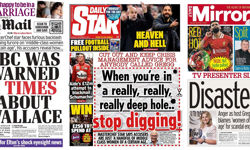I once interviewed a man who launched a newspaper that could also be worn as a hat. Unsurprisingly, he lost his shirt on the madcap idea.
But there was nothing to stop him trying.
He didn’t need a licence to launch his newspaper or was vetted in any way before he joined “the press”. Much in the same way that anyone with access to a computer can become a blogger.
In Britain, there is nothing to stop anyone launching a title however bonkers it might be. Some might even argue that the more bonkers a publisher or proprietor is the better.
They certainly aren’t all in it for the money as the history of loss making titles on Fleet Street shows. They’re in it for the power, influence and glamour that owning a newspaper brings.
No journalist I’ve spoken to is surprised that phone hacking took place at the tabloid end of Fleet Street. They know the scandal has damaged the image of journalism but most live in a very different world from the hackers and work for the vast majority of newspapers and magazines where there was no hacking culture.
So, how do you construct a way of regulating a press that at a national level ranges from the Financial Times to the Daily Star, and includes regional newspapers and hundreds of magazines whose publishers and journalists feel the whole phone hacking scandal is none of their doing?
Oh, and can you also come up with some recommendations for regulating the content of the internet?
That is the scale of the task faced by Lord Justice Leveson in drawing up his recommendations after nearly 100 days of evidence at the inquiry examining the culture, practices and ethics of the media.
But the inquiry is not just about the recommendations; Leveson also set out to examine the relationship of the press with the public, police and politicians.
The law of unintended consequences
It came as a bit of relief for journalists that Module 3 of the inquiry looked at the relations between the press and politicians rather than concentrating on scandalous behaviour by the tabloids.
The Daily Telegraph noted in a leader: "It is a rich irony that an inquiry set up by Mr Cameron to investigate press ethics has turned into a forensic investigation of his Government’s relationship with Rupert Murdoch’s News Corp."
While, Andrew Rawnsley in the Observer said of David Cameron's decision to commission Leveson: "It is a textbook example of a prime minister establishing an inquiry in a panic before he had fully thought through where it might lead. Where it has led is right to his own doorstep."
Module 3 saw evidence from Cameron as well as his predecessors at Number 10, Gordon Brown, Tony Blair and John Major.
What emerged was that the relations between those at the top of News International and the Government were extremely close, best exemplified by the way Cameron sometimes signed off texts "LOL" to NI chief Rebekah Brooks – until she explained this meant "laugh out loud", not "lots of love".
The inquiry heard that Brooks had sent a text to Cameron stating “professionally we’re definitely in this together” after the Sun had switched loyalty to his party ahead of the general election.
It seemed at one point that the revelations of emails from News Corp’s director of public affairs, Frederic Michel, to James Murdoch and other executives revealing Culture Secretary Jeremy Hunt's thoughts about the progress of the controversial BSkyB takeover plans could lead to Hunt losing his post.
In one message, Michel detailed what the Culture Secretary would say to Parliament the next day, noting that it was "absolutely illegal" for him to obtain the information.
Another email reported Hunt's belief that it would be "game over" for opponents of the BSkyB takeover once plans to spin Sky News into a separately listed company were publicly announced.
But in the end, it was Hunt’s special adviser who had to go. Adam Smith resigned after saying the “content and extent” of his contact with News Corp had not been authorised by Hunt and had given the impression that the government had “too close a relationship” with the company.
Rupert Murdoch said it was a "myth" that he exercised undue political power, or that he traded the allegiance of his newspapers for political favours. He denied he ever asked Thatcher for favours and insisted he was not "the power behind Thatcher's throne”.
Murdoch told Robert Jay QC, lead counsel at the inquiry: "I have never asked a prime minister for anything." Quizzed about his closeness to Tony Blair, Murdoch replied: "I want to say, Mr Jay, that I, in 10 years of his power, never asked Mr Blair for anything. Nor indeed did I receive any favours.”
Since appearing at the inquiry, Murdoch has resigned from the board of News International fuelling speculation about the future of his British titles. Murdoch had told Leveson: "I love newspapers… my shareholders would like me to get rid of them all."
Charles Moore commented in the Telegraph: “How do the public know what they know about Rupert Murdoch? Through the media. Which means that pretty much everything they know about him comes from his opponents or his friends. There is no middle ground. The media are either against him or they belong to him, in which case (though for how much longer?) they are for him.”
Moore added: “It will be a bad thing, for example, if people conclude that it is immoral for politicians, or their special advisers, to have close contact with the media. The country cannot be run properly if government departments do not know the people with whom they need to deal – doctors, farmers, soldiers, bankers, journalists, all sorts and conditions.”
A problem of recall
What was remarkable in much of the evidence given by politicians and proprietors was the lack of recall over meetings and events.
Helpfully, BBC News kept a tally of the number of times key figures said: "I don't remember," "I don't recall," "I can't remember" or "I can't recall". Cameron scored 49; James Murdoch 41; Rebekah Brooks 35; and Rupert Murdoch 30.
As well as the amnesia, there were completely conflicting views of events. It made you wonder how journalists can ever get a story right when the main protagonists give so vehemently different accounts of what allegedly happened.
For instance, Gordon Brown categorically denied that he ever called Murdoch in a rage after the Sun switched support to Cameron’s Tories before the last election.
Murdoch quoted Brown as saying: "Well, your company has declared war on my government and we have no alternative but to make war on your company." Brown said the claim was “wholly wrong”.
Brown also denied that he and his wife Sarah gave consent to the Sun to run a 2006 story about their son suffering from cystic fibrosis. The former prime minister asked the Leveson Inquiry: “Would any mother or father presented with a choice as to whether the medical condition of their four-month-old son should be broadcast on the front page of a tabloid newspaper, and who had a choice in this matter, allow it?”
He claimed he and his family were presented with a “fait accompli” and had no choice over the story being published.
Brooks told the Inquiry the story came from a father of another child cystic fibrosis sufferer, and maintained she had the Browns’ express permission before publishing the story. “If the Browns had asked me not to run the cystic fibrosis story, I wouldn’t have,” she said.
Major contradicted Murdoch’s claim of never having asked a PM for anything by stating he had asked him to change government policy on Europe in 1997, telling him: "I would like you to change your policy and if you don't change your policy my organisation cannot support you."
A Government minister told BBC political editor Nick Robinson: “People have been sucking up to the Murdochs and those who work for them for decades. It was our luck that the music stopped when we were in power.”
Or as Kelvin MacKenzie put it on BBC Question Time: "Blair arse-licked the Murdoch press. Cameron saw that and said 'we should do the same.' Then the music stopped."
Evgeny Lebedev, the proprietor of the London Evening Standard and Independent, told the inquiry he and his father Alexander had spent £75m keeping the titles afloat over the last three years.
Immediately after his testimony, Lebedev tweeted: "Forgot to tell #Leveson that it's unreasonable to expect individuals to spend £millions on newspapers and not have access to politician."
It was a refreshing bit of honesty after all the denials and the “I can’t remembers” from politicians and proprietors.
Module 4
Module 4 moved on to looking at the proposals “for potential press regulatory solutions”.
It was here that the industry – or at least a large part of it – played its cards with plans for a new beefed-up, independently-led self-regulation.
This was described as a regulator that would be more robust than the Press Complaints Commission without crossing the line into statutory controls.
Presented by Lord Black of Brentwood, chairman of the Press Standards Board of Finance, the new regulator would be able to impose “serious” financial penalties which would be legally enforceable.
Lord Black said his proposal was backed the Newspaper Society, the Newspaper Publishers Association, the Scottish Newspaper Society and the Professional Publishers Association.
It involves a complaints committee which would deal with complaints against the media, and a separate investigations and compliance panel with the power to call witnesses and demand documents as it looked into breaches of ethical standards.
The two arms of a new regulator would be overseen by an independent trust board, with members of the public making up the majority of its members, Lord Black said.
Publishers would sign up to a five-year rolling contract with the regulator, paying annual fees, and would face legally-enforceable penalties enshrined in the contract for any transgressions.
“This gives the new regulator an enforceable legal basis on which to work without the need for any form of statutory intervention,” said Lord Black.
Financial penalties would be decided by the trust board, which would have the power to levy fines of up to £1m for “systemic breakdowns in ethical behaviour”, he suggested.
He said any publisher who left the voluntary regulatory system would be liable for future fees covered in the contract.
They could also face other sanctions, he added, such as the withdrawal of press cards from their journalists, the withdrawal of access to Press Association copy and the loss of a proposed “kite mark”, which would make it harder to attract advertising.
Lord Black was adamant that there was no “halfway house” between statutory regulation and self-regulation and there was a philosophical objection to any state controls on the press.
Dissenting voices
The proposal was attacked as being just the old Press Complaints Commission in new clothing. NUJ general secretary Michelle Stanistreet claimed: “The proposals amount to more of the same. It is an attempt by owners and editors to continue the status quo.”
The NUJ has proposed what it described as “a new independent form of regulation, with a statutory backstop to establish the framework, terms of reference and stakeholder participation.”
David Sherborne, counsel for many of the phone hacking victims, told the inquiry that arguments put forward by newspapers that statutory regulation would lead to interference by politicians or have a "chilling effect" on investigative journalism were "specious".
He argued that the new press regulator should not involve working editors adjudicating on complaints.
"The public wants more objective standards and the starting point for that is an independent statute-backed regulator, which is created for the public and is not run by serving editors and one which can hold this enormously influential body to account, as they hold us to account in turn."
Sherborne said witheringly of the PCC that it was "still surviving, but only just breathing."
Many of the media academics who appeared before Leveson share the evangelical view that the phone hacking scandal offers a once in a generation opportunity to clean up national journalism at a time when the power of the Murdoch empire is diminished and MPs are no longer afraid of criticising his companies.
They argue that any new regulator needs statutory underpinning because self-regulation by the PCC proved a lamentable failure when dealing with the phone hacking scandal.
Media commentator Roy Greenslade, Professor of Journalism at City University, said: "In order to clean the house and to restore public confidence in our journalism, I reluctantly agree that parliament will need to provide enough power to a regulatory system to ensure that it has real teeth."
Steven Barnett, Professor of Communications at Westminster University, told Leveson: “This is a formative moment in public life.” He said there was less of a feeling of press power and parliament could “legislate in the public interest without fear.”
Former Formula One boss-turned privacy campaigner Max Mosley called for the creation of a press tribunal with powers to fine a newspaper group up to 10 per cent of turnover.
Among new sanctions suggested against offending newspapers were to put VAT on their newsprint bills and to exclude them from the Audit Bureau of Circulations and the National Readership Surveys.
There have been suggestions that politicians should be removed from making decisions about media takeovers.
Guardian editor-in-chief Alan Rusbridger urged Leveson to consider the issue of media ownership. He said: "Anything that concentrates power in the hands of fewer and fewer multibillionaire proprietors – whether corporations or individuals – will impoverish our society. That much has always been understood by anyone who has ever looked at the behaviour, standards, control and ethics of the press and it's why Leveson must say something strong on the issue, even if he cannot get into the detail."
The case for self-regulation of the press was undermined by the withdrawal of the Daily Express and Daily Star publisher Northern & Shell from the Press Complaints Commission in 2010.
For a new self-regulation regime to succeed, it needs the full support of the industry. It will also have to convince a public which has witnessed the distressing inquiry evidence of the McCanns and the Dowlers.
The final nail?
The debate on regulation comes at a time when the newspaper industry, particularly the regional press, is suffering closures and staff cuts caused by the impact of the digital revolution on its ad revenue in the middle of a recession.
Former Newspaper Society president and Birmingham Post and Mail owner Chris Oakley told a Society of Editors’ conference in May: “Hacking into people’s telephones and emails is already illegal and those who do it should be prosecuted unless they can show an indisputable public interest. We don’t need to spend lorry loads of public money at a time of austerity to tell us the obvious.
“On the other hand, the regional and local newspaper industry, whose titles are read by more people than all the nationals and which have a bigger influence on the lives of individuals and communities, is on the point of collapse. Twenty per cent of the UK’s local newspapers have closed in the last seven years, more than 240 titles, leaving sizeable communities from Port Talbot to Cannock from Leominster to Long Eaton without a title.”
Jonathan Caplan QC, counsel for Daily Mail publisher Associated Newspapers, urged Lord Justice Leveson against "reading the last rites on the industry which sees circulations falling year after year", with regional newspapers closing and the rise and rise of global internet news and social media.
He also warned Leveson he should not drive publishers out of the UK by making it impossible to operate, telling him some could move their internet operations abroad.
"Whatever recommendations your inquiry makes for future regulation, great care, we suggest, will need to be taken to ensure that it does not jeopardise the 19,000 jobs still remaining in British newspaper journalism or drive publishers in the great growth area of the internet to move their operations to another jurisdiction."
If editors were not involved in the new regulatory body that replaces the PCC, they would mount legal challenges at every opportunity, he added.
Relevance to B2B?
I wonder how many of the smaller magazine publishers share the views of Neil Thackray, co-founder of the new online and B2B magazine company Briefing Media.
He posted that he was surprised after buying some B2B titles to learn that Briefing Media was covered by the remit of the PCC and even more surprised to learn that the “levy” would cost £1,812 a year.
“A modest sum you might think. However when I checked with our team, no one could remember an occasion when a complaint had been made to the PCC about the titles we now own… There seems to be little point in belonging to a regulatory body that does no work, or has no need to do any work on our behalf. When Lord Justice Leveson's recommendations are finally published, let’s hope the funding of the PCC is more rationally thought through. Meanwhile I shan’t be paying the levy and I challenge any B2B media company to justify why they should either.”
There are those who say that the power of the press compared to politicians has been exaggerated. Dominic Lawson in the Sunday Times argued: "Neither the Sunday Times nor the newspaper industry as a whole can declare war on another country; it cannot demand up to half its readers’ income, with the threat of a prison sentence if they do not hand over the money; it cannot pass a single law, or make any parliament do so."
There are still misgivings that the Leveson Inquiry has been a tabloid-free zone which has shown little understanding of the popular press, demonstrated by the lack of anyone with mid or popular market experience on its six-strong advisory panel.
Rupert Murdoch’s biographer Michael Wolff gave a US perspective in GQ: “The greatest tabloid culture in the world was created out of the joie de guerre of fighting the rules: the reporters are more aggressive, the techniques more intrusive and the prose more lurid, because the market demands it.
“By over-regulating, you increase the value of outsmarting the regulations. Anyway, convict the malefactors if you can and put them in jail. But otherwise resist the reflex to regulate and go home and enjoy the last days of the newspaper business. You'll miss them soon enough.”
In the end, it all seems to come down to the “s” word. If Lord Justice Leveson recommends some form of statutory regulation to underpin a new regulatory system, it will be crucial to see how strong the reaction will be from those who, like the Telegraph and Mail, see it as the thin end of the wedge to state control.
Our national press is good at outrage. The Mail’s Peter Hitchens commented on Leveson: “My guess is that the police and the CPS are restrained mainly by the existence of a strong free press. Well, listen to the sound of saws and chisels. Lord Justice Leveson is busy making a coffin for that. And when the strong free press is gone, wait for the knock on the door.”
A judge may be immune to press outrage. But in the end it will be down to politicians to accept or reject Lord Justice Leveson’s recommendations.
There’s a big difference between MPs and a judge. Politicians want to get re-elected.












